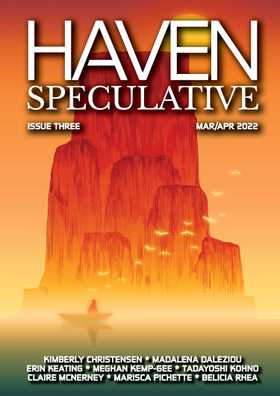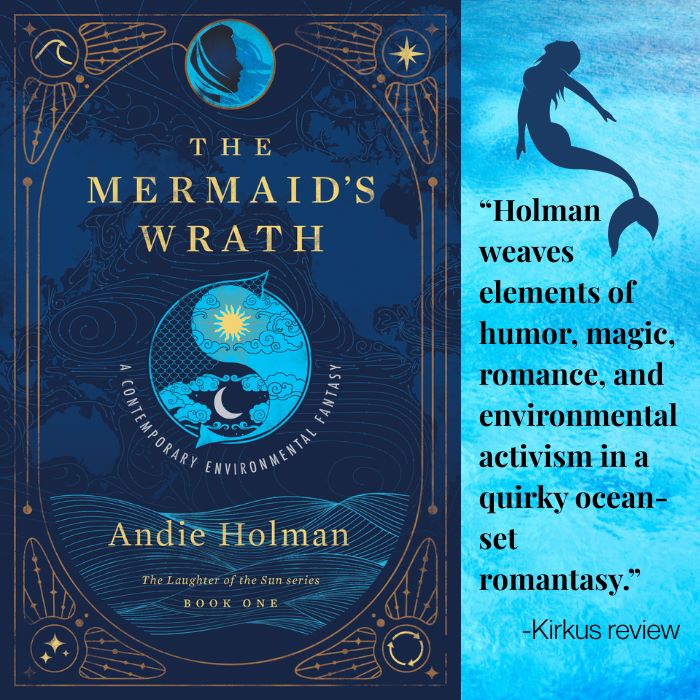FICTION
The End of the World
by Meghan Kemp-Gee in Issue Three, March 2022
I met you in London last July, on the hottest day ever recorded, during the last two weeks of my research fellowship at the Cambridge University archives. The vaults and reading rooms were quiet and cool, so like all the other fellows, I stayed until the very last minute they were open. Nowhere else in the city had such dependable air conditioning.
I made polite conversation with a couple of grad students in the coat room as we gathered up our hats and sunglasses and purses. They convinced me to go to a pub with them. I wondered if they were only inviting me because they imagined I was lonely after six weeks so far from home. They wore long slacks and collared shirts even in the summer’s strange, sticky heat.
I found myself nursing half a lukewarm beer at a crowded, too-noisy pub that suddenly seemed an exhaustingly long distance from my room. Someone had set up a huge collection of electric fans along the bar, an almost funny assortment of sizes and shapes, like a little museum exhibit (Electric Fans Throughout the Years), keeping the pub mercifully cool despite our mass of damp bodies. The flow of air from the fans created a constant rippling and fluttering of everyone’s hair and loose clothing, and the effect was to make us all look weirdly shaky and unsettled, everyone struggling to stay calm and friendly while in perpetual motion, everything happening over the tinny electric buzz of the little motors.
I was trying to follow the conversation between you and a redheaded undergraduate sitting across the table. You were both yelling to be heard above the music and the other voices and the noise from the fans. I tried and failed to place his accent, so instead I watched him wipe the sweat from his upper lip with the back of his hand. He was sitting across from me, and you were sitting beside me, and I hadn’t even looked at you, but then you put your hand on my shoulder to tell the kid my name. The grad students had introduced me to a handful of nameless, faceless people before they wandered off, but somehow, I hadn’t noticed you.
And then I did.
You were from Australia. The redheaded kid faded away after a while, and sometime after that you ran your fingernails over the red marks where my laptop bag had dug into my shoulder. I asked you why you did that, and you said, “Sorry, I thought it was a scar.”
You were in London doing a certificate program in ESL education. I asked how you got interested in teaching, but instead you told me about all the different nightclubs you’d been to in London, and about all the different boys you could meet there, funny boys from Ireland and drunk boys from Japan and Germans who liked to dance and tall boys from Amsterdam with little homemade tattoos on their fingers. You laughed while you told me stories and I laughed while I imagined what it would be like to be like you, to pick the funniest, strangest boy at a club and bring him back to my room.
When the sun started to set, you walked back with me. There was a strike, so the Tube wasn’t running, but the distance wasn’t too far to walk as long as it was later in the day. Most people were staying inside, so the streets were quieter than usual. That summer, London smelled like hot concrete and the piles of garbage on the sidewalks that grew larger week by week, but after I met you, London smelled like your warm mouth and the sharp chemical sweetness of your shampoo as you led me up the stairs to my own apartment, like you were the one staying there, and I was the stranger you were bringing home.
You fell asleep with your legs wrapped around me, and I fell asleep with my cheek pressed against the muscles of your shoulder. I remember that the cotton of your t-shirt felt unbelievably soft against my face, and I imagined that you were the kind of person who sought out incredible pleasure in every purchased object and small detail in your life, and I fell asleep aspiring to be one of those things.
Two weeks later you hugged me at the airport and promised that you’d visit soon, which I believed, because I believe everything you’ve ever told me.
Back in Toronto, everywhere had good air-conditioning. It was suddenly September, so I was back at the university, teaching two courses and making first-year students laugh when I demonstrated how to pronounce the Prologue from The Canterbury Tales. You texted me hundreds of pictures of you in your underwear. In October I submitted my dissertation, a 200-page analysis of the grammar and verse form of British Library MS35290, a fifteenth-century manuscript known as the York Mystery Plays.
My advisor took me out to dinner to celebrate. We had too many glasses of wine, and when he asked me how it felt to be ‘Capital-D Done,’ I told him I felt strangely empty, and also a bit like the character God at the end of the mystery play about the Last Judgement, who says Nowe is fulfillid all my forthoght, For endid is all erthely thyng; All worldly wightis that I haue wroght, Aftir ther werkis haue nowe wonnyng. When I got home, I threw up in the toilet and then played Tetris with you over the internet until dawn.
On the day before Halloween, someone detonated a small nuclear device in Jakarta. After that, things changed very quickly.
I texted you several times each day to make sure you were alright, and I would get anxious and angry if you didn’t answer right away. When I asked you how things were going, you didn’t talk about the things I was really asking about, the things I saw happening on the news. You had moved back home with your parents, and you talked about things like watching movies with your sister, or the dog peeing on your suitcases, or helping your father fix the broken kitchen sink.
On November 8th, you emailed and told me that your mum was sick, and then I didn’t hear from you for a week. When you came back online, you never told me what happened after you took your mother to the hospital, so I didn’t ask. Sometimes we talked all night over instant messenger, typing thousands and thousands of messages, and sometimes I sat in the dark and sobbed, and sometimes I scrolled through my phone and wondered numbly at all the different ways I’d spelled OK: okay, ok, O.K.
Meanwhile, there was a two-week hostage situation at McGill, and U of T closed for the rest of the term as a precaution. I’d already stopped going to campus. I was busy, walking every day to the Immigration and Citizenship offices in Deer Park. Every day I’d arrive at 4:30 a.m. and wait in line until the afternoon. When I got to the front of the line, I’d always get another form or some additional piece of information, always finding that I’d need to come back when I had some extra little thing that I didn’t have yet, like your passport number, or a scanned copy of your birth certificate, or another two thousand dollars. The wireless connection at the Immigration office was always bad, so I went to a coffee shop nearby to send you emails and updates, and then I’d go back the next day and start again. I had a PDF of our marriage license with your signature on it, so we just needed the travel visa. On November 25th, the woman behind the bulletproof glass at the front of the line told me that they were no longer issuing spousal visas for affected areas, and then some stuff about refugees, contamination, triage. When I heard that word ‘contamination,’ I had to ask the woman to repeat it, to explain again, and she made a terrible face and said some things that I wish I didn’t have to hear.
On my way home, a man in a dirty coat asked me for some change, and when I told him I didn’t have any, he cried and walked away. That month there seemed to be more and more homeless people every day, but then they all suddenly disappeared as soon as the first snow fell on November 28th. I remember noticing their sudden absence, and I also remember how no one ever talked about them or asked out loud where they had gone.
I stopped going to the Immigration office after that. Like most people, I stopped going anywhere. I stayed inside and talked to you. You told me about all the things you’d show me in Australia as soon as the planes started flying again. When your voice got scratchy and you started sniffing, I’d tell you about other things, like the temperature outside or how the Prime Minister said ‘fuck’ on live television yesterday. Every day after I ate lunch, I talked to you until you fell asleep. I talked until I ran out of things to talk about, and then I would read to you from my grammar tables of Old English nouns until I was sure you’d gone to sleep:
Sorg is the word for ‘sorrow’. Sorg, Sorge, Sorga, Sorga, Sorgum. It is one of the ‘strong feminine’ nouns, which come in short and long varieties. The ending -u appears in the nominative singular after short syllables, as in ġiefu (gift), but is dropped after long ones. Sometimes, however, the ending gets restored—for example, in lenġu (length), iermðu (misery), and brǣdu (breadth).*
The next time I saw you was in Paris. Neither of us had ever been there before. I showed you the tapestries at the Musée du Moyen Âge, and then we had lunch at a sunny restaurant nearby. You were learning French and you practiced with the elderly waiter, who recommended a place to buy groceries for dinner on our way home. We got sick on too much white bread and rosé and stumbled home to an apartment in Le Marais, where we lay on the bed and I stared at the way the sunlight illuminated the small blond hairs on your arms and chest until it looked like you were made of gold. We were concretely, perfectly, gorgeously far away from long winters and bitter fallout and your distant, shattered continent.
But this ending never really happened. I’ve never been to Paris. I haven’t heard from you in three months.
It’s the end of the world.
If I choose to believe what I read on the internet, I won’t hear from you again. But I don’t believe that you are really gone. I wake up each morning and I imagine that you are sleeping peacefully in the dark and quiet on the other side of the planet.
* These beautiful grammatical instructions were adapted from text first published online by Western Michigan University under the title “E-Intro to Old English”. They are no longer available.
© Meghan Kemp-Gee
Meghan Kemp-Gee
Meghan Kemp-Gee lives somewhere between Vancouver, BC, and Fredericton, NB. She writes poetry, comics, and scripts of all kinds. She also teaches composition and plays ultimate frisbee. She co-created the webcomics Contested Strip and Space Heroines of El-Andoo, and her comics and short fiction have been published in numerous anthologies. Her poetry has recently appeared in PRISM, Copper Nickel, Rising Phoenix Review, The Shore, Stone of Madness, Altadena Poetry Review, Anomaly, Train, and Rejection Letters. You can find her on Twitter @MadMollGreen.





